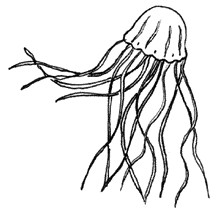 We southerners often hear northerners complaining of the bitter cold where they live, the unrelenting snow that keeps piling up until it seems futile to even try to shovel the driveway, those miserable long winters that go on and on and on while you're shut in like a hibernating bear. But if it's so bad, why do they stay? Because they too, have learned that the place they love and call home also has its drawbacks. We southerners often hear northerners complaining of the bitter cold where they live, the unrelenting snow that keeps piling up until it seems futile to even try to shovel the driveway, those miserable long winters that go on and on and on while you're shut in like a hibernating bear. But if it's so bad, why do they stay? Because they too, have learned that the place they love and call home also has its drawbacks.
Here are a few of Florida's treasure guardians. Some crawl, some fly, some swim and some turn up where you least expect them. I'm sure there are plenty I have overlooked. Know that they are there, but don't let them keep you from coming and having a great time.
No-see-ums (pronounced "sure-feel-ums"). They're also known as sand fleas and they can make a morning or late afternoon at the beach unbearable--especially during the summer and early fall. They're nearly invisible and instead of stinging you like any decent insect, they prefer to use your skin as a convenient outhouse. The biting sensation is actually the acid in their...well, you get the picture. Rub a little Avon-Skin-So-Soft on your skin before hitting the beach and they should leave you alone.
 Mosquitoes. Here in Florida, we call the dance that most unprepared northerners do the "Smackerena." Summers are the worst, particularly if you decide to visit the Everglades. Don't put on just any old spray; make sure you have something with a heavy diethyl content, such as Deep Woods Off or Sportsmen Formula Repel. Only the females bite, of course, which is just their way of getting even with men for leaving the toilet seat lid up. Mosquitoes. Here in Florida, we call the dance that most unprepared northerners do the "Smackerena." Summers are the worst, particularly if you decide to visit the Everglades. Don't put on just any old spray; make sure you have something with a heavy diethyl content, such as Deep Woods Off or Sportsmen Formula Repel. Only the females bite, of course, which is just their way of getting even with men for leaving the toilet seat lid up.
Fire ants. Even though they are not native to Florida, there are more fire ants here in a single acre than there are people in the entire state at the peak of the tourist season. Unless you're trying out for the fancy high-stepping musical "River Dance," don't stand still in sand or grass without keeping a close eye on your feet (and your children's). They're red and called fire ants for a reason. Their bite is like someone touched your skin with a lighted match. I've never tried it personally, but some of my old timer friends tell me that if they do bite you, rub citrus peeling on the spot and it will ease the pain and prevent the sore from bubbling up like a burn.
Cow ants. Look for a beautiful black and red, velvet-coated ant about 3/4 of an inch long. You won't find them in a mound and they wander around cow pastures, mostly as loners. If they can knock a cow on its hiney, imagine what their bite can do to you. Observe them from a distance and you'll be fine. 
Palmetto Bug or Cucaracha (cockroach). They've got to be the ugliest, most despicable-looking creature alive, but I'm sure their mothers love them. Palmettos appear to be roughly the size of a Buick - up to two inches for the American cockroach or 5/8 of an inch for the German cockroach, they usually wait until you stumble into the bathroom in the middle of the night before flying kamikaze-like in your direction. Keep all food tightly sealed or locked in the refrigerator to keep their numbers down. Wear a pace-maker when you get up at night.
Wolf Spider. Next to a cat, it's your best defense against cockroaches, other insects, or in-laws who tend to stay too long. They're big and brown with up to a five-inch leg span, non-poisonous, and patrol your house at night for other creepy crawlers to munch on. Give them their space.
 Love Bugs. These are harmless black flying insects that often fly united, living for about 24 hours, which is plenty long enough to make a thorough mess of your windshield. For some reason they are attracted to hot highway pavement. Tolerance is your best weapon. That and lots of soapy water to keep your car clean. Love Bugs. These are harmless black flying insects that often fly united, living for about 24 hours, which is plenty long enough to make a thorough mess of your windshield. For some reason they are attracted to hot highway pavement. Tolerance is your best weapon. That and lots of soapy water to keep your car clean.
Stingrays. These flat, kite-shaped creatures love to half-bury themselves in sand in shallow water. Their tails are long and whip-like, with a poisonous barbed spine near the end. They don't like to be walked on any more than you do. Wearing shoes doesn't always help. Shuffle your feet while venturing into the ocean for a swim.
Barracuda. A newcomer to Florida might be unaware that these narrow silver fish with a faces resembling Sammy Davis Jr.'s enjoy very quick snack on anything sparkley - including an ankle bracelets. They like to hang out in the shallow water, so leave the jewelry behind while you swim.
Jellyfish.  Dead or alive, these clear, balloon-like creatures can be a problem if you love to swim at the beach. As long as their tentacles are wet, they can sting, and yet their harpoon-like stingers are so short they usually can't pass through a t-shirt. Some people apply Avon-Skin-So-Soft before taking a dip, while others wear thin body suits. If you've been stung, the type of treatment depends on the type of jellyfish that committed the offense. Some folks recommend dumping vinegar on the wounds if they're the result of a jellyfish sting. But for the Portuguese man-o-war, a cold-pack might do the trick. Your best bet is to describe the type of jellyfish to a physician and let him or her make the call. The best way to tell if there are jellyfish in the water is to let your spouse get wet first. Dead or alive, these clear, balloon-like creatures can be a problem if you love to swim at the beach. As long as their tentacles are wet, they can sting, and yet their harpoon-like stingers are so short they usually can't pass through a t-shirt. Some people apply Avon-Skin-So-Soft before taking a dip, while others wear thin body suits. If you've been stung, the type of treatment depends on the type of jellyfish that committed the offense. Some folks recommend dumping vinegar on the wounds if they're the result of a jellyfish sting. But for the Portuguese man-o-war, a cold-pack might do the trick. Your best bet is to describe the type of jellyfish to a physician and let him or her make the call. The best way to tell if there are jellyfish in the water is to let your spouse get wet first.
Bikinis. More than any other treasure guardian, this one will get you in the most trouble--especially if your wife is next to you. If you're sitting on the beach and one strolls by, don't stare. All right, if you can't help yourself, it sometimes helps to confront the issue head on and tell your wife that she would certainly look much better in that bikini than the petite bombshell wearing it. She may not believe you, but it's a much better response than denying you were even paying attention!
Geckos. These little 1 - 2 inch salamander-like lizards are actually our allies, because they dine on mosquitoes and other annoying pests. They scamper around on the walls, on plants - you'll find them just about anywhere of you look hard enough. Some like to show off a brightly colored neckwear to let you know they're available.
Alligators.So what if an average adult can reach 14 feet and weigh in excess of 500 pounds. You were the high school wrestling champion back in 1962 and you're not afraid of anyone or anything. While a cavalier attitude doesn't go over well with a large alligator, excessive concern may keep you from enjoying such fine Florida pastimes as canoeing, swimming or fishing. Overall, alligators would much prefer a tasty foot-long fish to your preservative-filled body. Respect is the key word here. Enjoy the outdoors but give them as much room as you would an approaching aircraft carrier or a religious zealot.
Snakes.Florida's got about as many types of snakes as there are letters in the alphabet. And while six are venomous, consider that--like the alligator--they play more defense than offense. If an area looks like it might have snakes, it probably does. Be loud, carry a big stick and poke in the tall grass in front of you as you walk. But again, don't let them keep you from having fun. If you do get bitten, try to remember what the snake looked like and describe it to your physician for treatment. And don't kill them just because they scare you. Unlike us, they're an important part of the food chain. More snakes equals fewer rats. Don't make the same mistakes as those in Washington.
Mark Renz is a Lehigh Acres native who guides people on day-trips into the Everglades or to area fossil hot spots. |
 By Mark Renz
By Mark Renz

 Love Bugs. These are harmless black flying insects that often fly united, living for about 24 hours, which is plenty long enough to make a thorough mess of your windshield. For some reason they are attracted to hot highway pavement. Tolerance is your best weapon. That and lots of soapy water to keep your car clean.
Love Bugs. These are harmless black flying insects that often fly united, living for about 24 hours, which is plenty long enough to make a thorough mess of your windshield. For some reason they are attracted to hot highway pavement. Tolerance is your best weapon. That and lots of soapy water to keep your car clean. Dead or alive, these clear, balloon-like creatures can be a problem if you love to swim at the beach. As long as their tentacles are wet, they can sting, and yet their harpoon-like stingers are so short they usually can't pass through a t-shirt. Some people apply Avon-Skin-So-Soft before taking a dip, while others wear thin body suits. If you've been stung, the type of treatment depends on the type of jellyfish that committed the offense. Some folks recommend dumping vinegar on the wounds if they're the result of a jellyfish sting. But for the Portuguese man-o-war, a cold-pack might do the trick. Your best bet is to describe the type of jellyfish to a physician and let him or her make the call. The best way to tell if there are jellyfish in the water is to let your spouse get wet first.
Dead or alive, these clear, balloon-like creatures can be a problem if you love to swim at the beach. As long as their tentacles are wet, they can sting, and yet their harpoon-like stingers are so short they usually can't pass through a t-shirt. Some people apply Avon-Skin-So-Soft before taking a dip, while others wear thin body suits. If you've been stung, the type of treatment depends on the type of jellyfish that committed the offense. Some folks recommend dumping vinegar on the wounds if they're the result of a jellyfish sting. But for the Portuguese man-o-war, a cold-pack might do the trick. Your best bet is to describe the type of jellyfish to a physician and let him or her make the call. The best way to tell if there are jellyfish in the water is to let your spouse get wet first. Therapik Offers A Technological Twist For Bug Bite & Sting Relief
Therapik Offers A Technological Twist For Bug Bite & Sting Relief